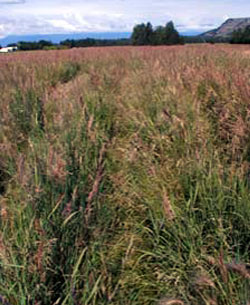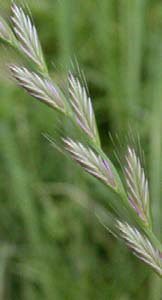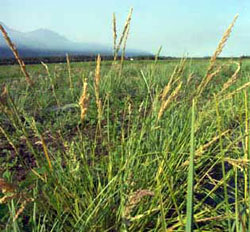| Chapter 5: Cultivars and Species for Use in Alaska Commercially Available Species and Cultivars Reedgrass, Bluejoint ‘Sourdough’ bluejoint reedgrass is a cultivar with a wide range of adaptability. The species occurs throughout Alaska on both dry and wet sites. The cultivar was developed by the University of Alaska Agricultural Experiment Station for revegetation in northern latitudes (Mitchell, 1979). Commercial availability is erratic and when it is available, the seed is expensive (Wright, 1992). 
Figure 94: ‘Sourdough’ bluejoint reedgrass
Ryegrass, Annual Ryegrass, Perennial There are no cultivars called for in annual or perennial ryegrass since long-term survival is not critical and may not be desirable. These species provide a quick, temporary cover and should be limited to 10% or less of a seed mix. The use of these species should be limited because they use nutrients that are intended for the perennial species in the mix and can produce a heavy plant cover, slowing the growth of the perennial species. Annual and perennial ryegrasses are also very attractive to herbivores, causing potential vehicle/animal conflicts. 
Figure 97: Annual ryegrass, Lolium multiflorum
Sloughgrass, American ‘Egan’ American sloughgrass was released by the Alaska Plant Materials Center in 1990 as a wetland rehabilitation cultivar (Wright, 1991a). This is the state's first cultivar developed solely for wetland restoration. Additionally, the species benefits wildlife by providing forage and seed for waterfowl (Wright, 1992). 
Figure 93: ‘Egan’ American sloughgrass
|
